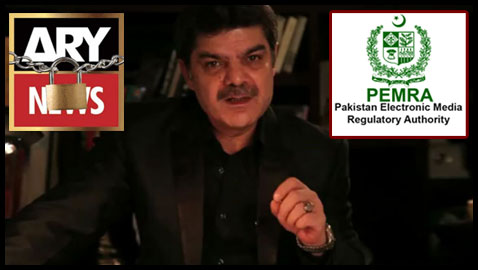
In a most recent Government led attack on freedom of expression, Pakistan Electronic Media Regularity Authority (PEMRA) ordered ‘ARY News’ off the air for 15 days, with an imposed levy of Rs. 10 million on this most popular media group. The media ‘licencing authority’ which has almost become the ‘media silencing authority’ also banned ‘Khara Sach’ program aired on ARY News and its presenter Mubasher Lucman. It is the latest action of Nawaz government in an organised campaign of pestering and bullying ARY network on account of its punchy programming and an often populist tone. The decision came at a time when under Nawaz Government, Pakistan is ranked 158 out of 173 in the 2013-14 Press Freedom Index.
Although PEMRA was originally intended to be a distinct body under supervision of the cabinet, it was transferred to fall under the purview of the Information Ministry, thus weakening its independence from government. Nawaz government wants to use PEMRA as institutional form of control of “press advice system’’. In which government officials will constantly tell Pakistani news outlets and editors how to behave, what to publish and what to broadcast.
Mubasher Lucman and ARY has been punished for raising a very basic question in a lawless society and the question was whether the Law makers are above the Law in this land of the pure (Pakistan). Astonishingly enough, a Judge of the Lahore High Court namely Justice Mazahar Naqvi had taken the notice of grave allegations leveled against him, in a program hosted by Mubasher Lucman on ARY. The above mentioned judge banned Mubasher Lucman as well as his programme. Mr. Justice Naqvi has not taken into account that in many countries across the world, superior Judiciary has already restricted the ability of government bodies, including judicial courts, elected bodies, State-owned corporations and even political parties, to bring an action against journalists for defamation. This is in recognition of the vital importance in a democracy of open disparagement of government and public authorities including courts. The judges should not restrict the freedom of expression in such a way as there are plenty of opportunities available to Pakistani judges to defend themselves from criticism.
This self-centered action of Justice Naqvi reminded me the famous verse of the second century roman poet Juvenal who said, ‘quiscustodietipsoscustodes’ (who will guard the Guards). In a democratic country the judiciary is supposed to be an essential check and balance on the other instruments of the government, ensuring that laws of the legislature and the acts of the parliament comply with international human rights including the Freedom of expression. While the various segments of Pakistani society have extended an unparalleled support to Independence of Judiciary; the Pakistani Judiciary should appreciate the fact that Independence is not an end in itself. The independence of Judiciary should play a pivotal role in promoting freedom of expression and civil rights. Catherine Anne Fraser, Chief Justice of Alberta, Canada has once said, ‘We have independence for one reason – to protect the rights of our citizen’.
This must be recognised that criticism on Judiciary by media is the recognition that independence and rights of the judges are not absolute. In democratic countries judges are often criticised savagely and severally by the media. However it appears from such orders that Judiciary in Pakistan feels sanctified. Equipped with so much power, there is a development of ‘arrogance of the office’ with a feeling of being untouchable.
No hay comentarios:
Publicar un comentario